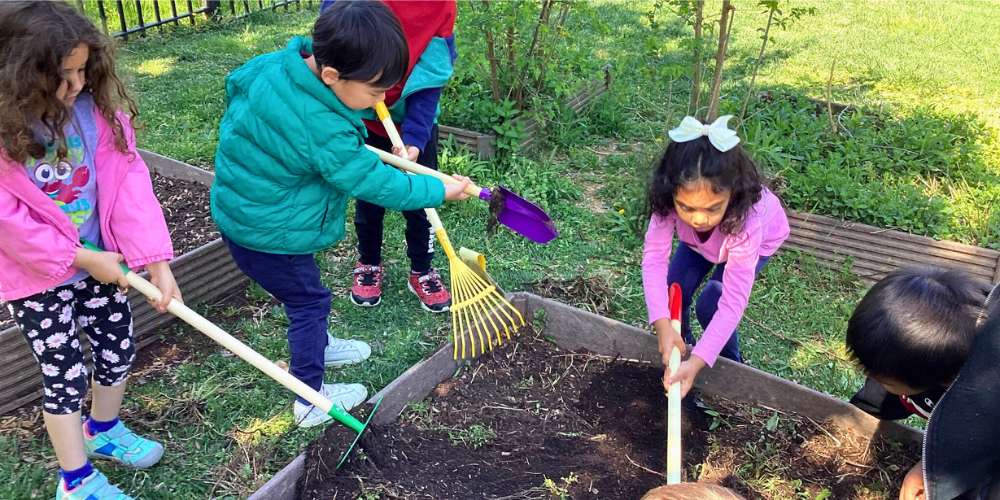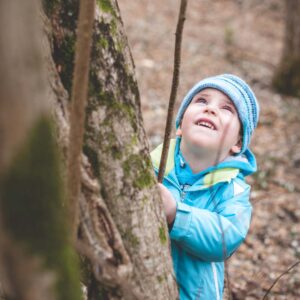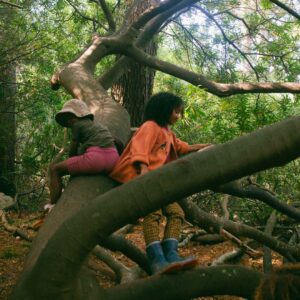
26 Apr Montessori & Nature: Learning Through Outdoor Play
Exposure to nature and outdoor play from a young age can positively impact the life of your child in many ways. Nature activates all 5 senses allowing children to discover and develop their senses, coordination, and vocabulary. Outdoor play and time in nature stimulate a child’s naturally ‘absorbent mind,’ providing them exposure to scientific concepts and principles that cannot be taught from inside the classroom. Incorporating nature-based play into your child’s routine will yield positive results for both you, and your child. Keep reading to learn more about how to maximize your family’s time in nature and for a FREE Printable Family Spring Bucket List.
How the Montessori Method Views Nature
-
-
- The sensorial aspect of nature is rich in sounds, sights, feels, smells, and tastes – there is always something new to explore and discover.
- The Montessori method of education focuses on the connection between child development and nature, as spending time outdoors and being immersed in nature promotes the ongoing development of social-emotional, physical, and cognitive skills.
- Becoming curious about and comfortable with nature at an early age helps children develop a more environmental-friendly outlook and an appreciation for the natural world that they maintain throughout their lifetime.
-

Scientific Benefits of Outdoor Exploration & Play
-
-
- Sunlight boosts the body’s natural Serotonin and Vitamin D levels which can lead to lower stress and anxiety and even fight off diseases.
- Children that spend consistent time outside are found to be less likely to suffer from mental illness and less likely to be impacted by ADHD.
- Playing in nature involves a greater range of muscle strengthening play and unique movements. Options on traditional playgrounds and play equipment provide children with a limited range of motions to explore.
- Self expression, adaptability, imagination, and creativity are developed through outdoor play.
- Real, hands-on experiences help make significant connections with peers and form social connections.
- Connecting with nature helps children better understand abstract scientific and sensorial concepts by providing real world examples.
-
Scientific Benefits of ‘Risky’ Outdoor Play
Children are often willing to joyfully take risks while educators and parents choose to put safety first. Adults should take a step back and allow children to test their own limits and assess risks. By allowing ‘risky’ outdoor play to occur while under the watchful eye of trusted adults, children can still enjoy the benefits while following the proper guidelines.
Risky play can build:
-
-
- Risk assessment skills
- Emotional regulation
- Self-esteem
- Taking initiative
- Problem solving and creativity
- Physical and mental development
- Ability to deal with failure
- Development of social skills
-

Risky Play Language
Saying “be careful” when a child is climbing on a piece of playground equipment or climbing a tree may impose fear rather than caution.
Try using one or all of the following instead:
-
-
-
- “Stay focused on what you are doing”
- “Take your time”
- “Do you need more space for what you are doing?”
- “Do you feel balanced?”
- “I am here if you need me”
- “What do you think the next step is?”
- “Do you feel secure where you are?”
-
-
Children thrive in nature. Not only do they learn about the world around them, but they also learn how to make meaningful connections with their peers and environment. If you are interested in incorporating more time outside into your family’s routine, enjoy a free printable Spring Bucket List download to use this Spring and Summer.


